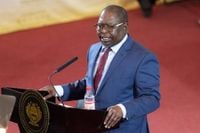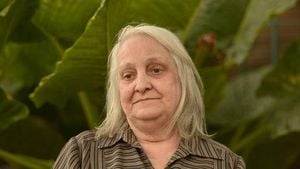The treasury announced shortly after midnight on Thursday, April 24, 2025, that the Value-Added Tax (VAT) rate will remain at 15%, bringing to an end a two-month political battle over an imminent unpopular increase to the tax. Finance Minister Enoch Godongwana will introduce legislation that reverses his decision to implement an initial 0.5 percentage point hike on May 1, 2025, followed by a second increase by the same margin on April 1 next year.
“The minister of finance will shortly introduce the Rates and Monetary Amounts and the Amendment of Revenue Laws Bill (Rates Bill), which proposes to maintain the VAT rate at 15% from May 1, 2025, instead of the proposed increase to VAT announced in the budget in March,” the treasury stated.
The official announcement came shortly after the Democratic Alliance (DA) issued a statement confirming that it had been approached by counsel for the minister proposing a settlement in its legal challenge to the VAT hike. This came a day after the Western Cape High Court heard the first part of the court application in which the DA sought an urgent interdict to prevent the increase from taking effect next week. The Economic Freedom Fighters (EFF) have joined in the matter.
The standoff between the DA and the African National Congress (ANC) over the tax increase has, in recent weeks, brought the ruling coalition to the brink, after the former official opposition defied instructions to vote in support of the fiscal framework. But in the end, neither party was prepared to walk away from their post-election pact.
Godongwana has insisted that there was no viable alternative that would allow him to raise the revenue needed to shore up social services after a series of cuts resulted in a shortage of teachers and doctors. In its statement, the treasury said reversing the decision to increase VAT would result in a R75 billion budget shortfall, which would demand a reprioritization of expenditure for the next three years.
“By not increasing VAT, estimated revenue will fall short by around R75 billion over the medium term,” the department said. “As a result, the minister of finance has written to the Speaker of the National Assembly to indicate that he is withdrawing the Appropriation Bill and the Division of Revenue Bill, in order to propose expenditure adjustments to cover this shortfall in revenue.”
This would be done in a way that did not prejudice South Africa’s fiscal sustainability, it added. Godongwana will introduce revised versions of the two bills within the next few weeks.
The VAT debacle has been personally bruising for Godongwana, who said publicly that he took the decision to increase the rate despite reservations from senior treasury officials. The fiscal framework was adopted by the National Assembly by 194 to 182 votes after ActionSA agreed to support it on condition that the minister urgently considered alternatives to the VAT hike.
But in his court papers, Godongwana insisted that it was impossible to halt the increase at this stage. On Tuesday, counsel for the EFF told the court this was proof that support for the fiscal framework was secured through deception, rendering parliament’s decision unlawful and void.
Godongwana has finally caved to widespread pressure, canning the planned 0.5 percentage point hike in VAT. National Treasury announced the decision in a statement issued just after midnight, saying the minister “will shortly introduce the Rates and Monetary Amounts and the Amendment of Revenue Laws Bill [Rates Bill], which proposes to maintain the VAT rate at 15% from May 1, 2025, instead of the proposed increase announced in the Budget in March.”
The latest move comes as the DA and EFF have taken the matter to the Western Cape High Court, after being amongst the most vocal against the VAT hike since it was first mooted at a higher rate in the cancelled February budget. Godongwana and the ANC pushed ahead with a lower increase tabled in the March budget, putting the Government of National Unity (GNU) at risk, after the DA threatened a GNU exit at one stage.
The ANC later secured support from ActionSA, which is not part of the national coalition government, to approve the March budget. Despite ActionSA’s vote, it has also been vehemently against the VAT hike. “The decision to forgo the increase follows extensive consultations with political parties, and careful consideration of the recommendations of the parliamentary committees,” National Treasury noted on Thursday.
“By not increasing VAT, estimated revenue will fall short by around R75 billion over the medium term. As a result, the Minister of Finance has written to the Speaker of the National Assembly to indicate that he is withdrawing the Appropriation Bill and the Division of Revenue Bill, in order to propose expenditure adjustments to cover this shortfall in revenue,” National Treasury added.
In a separate voice note on social media following National Treasury’s announcement, DA federal chair Helen Zille confirmed that “lawyers acting for the Minister of Finance have approached the DA’s lawyers proposing an out-of-court settlement” in relation to the party’s court action to interdict the planned VAT increase.
“The DA is awaiting a formal written offer from the minister’s [Godongwana’s] lawyers before we respond to the request. We will update the public in due course of any further developments,” she said. “We can also confirm that later today [April 24] we will be meeting an ANC delegation to discuss this [VAT] matter and other matters related to the GNU,” added Zille.
Meanwhile, National Treasury said that parliament “will be requested to adjust expenditure in a manner that ensures that the loss of revenue does not harm South Africa’s fiscal sustainability.” At this stage, it is unclear whether Godongwana will need to present a new budget altogether, with full updates on SA’s fiscal position and possible changes to other expenditure plans announced in Budget 2.0 in March.
The decision not to increase VAT means that the measures to cushion lower-income households against the potential negative impact of the rate increase now need to be withdrawn and other expenditure decisions revisited,” the National Treasury’s statement noted.
“To offset the unavoidable expenditure adjustments, any additional revenue collected by SARS [the South African Revenue Service] may be considered for this purpose going forward. The Minister of Finance expects to introduce a revised version of the Appropriation Bill and Division of Revenue Bill within the next few weeks,” it added.
Funding critical frontline services was a major motivation behind the initial proposal for an increase to the VAT rate, which aimed to restore and replenish the funding of critical services that had suffered reductions necessitated by the country’s constrained fiscal position. “There are many suggestions, however, some of them would create greater negative consequences for growth and employment and some of them, while worthwhile, would not provide an immediate avenue for further revenue in the short term to replace a VAT increase,” it noted.
South Africa's budget was postponed for the first time in February, revealing tension within the coalition government over the proposed VAT increase. Godongwana had been scheduled to present the first budget under the GNU, formed last June between the ANC, DA, and other smaller parties. However, after a Cabinet meeting led by President Cyril Ramaphosa overran due to a heated row about the proposed 2 percentage point VAT increase to 17%, Speaker Thoko Didiza announced that the budget speech would be postponed to March 12, 2025.
The last VAT increase in the country occurred in 2018, when public finances were in a significantly worse condition due to years of mismanagement under former president Jacob Zuma and the loss of investment-grade credit ratings. VAT remains a politically sensitive issue in South Africa, where stark post-apartheid inequality persists and over a third of the population is unemployed, despite the zero-rating on many essential goods used by the poor.
When Godongwana finally tabled the revised budget in March 2025, he announced an increase of 0.5 percentage points in 2025/26 and a further 0.5 percentage points in 2026/27, a move that sparked a parliamentary showdown between the ANC and the DA, co-leaders of the GNU. The national budget was ultimately passed in Parliament, with 194 members voting in favour of the fiscal framework and 182 against it.
The DA did not let the matter rest. The party filed papers in the Western Cape High Court, challenging Parliament's approval of the budget. They argued that certain revenue collection and expenditure measures had become binding via a speech by the finance minister, without proper parliamentary oversight or approval. On Tuesday, the DA and EFF united in legal action against the ANC's proposed VAT increase, calling it a "blunder" that would harm millions of economically strained South Africans.
The EFF accused the ANC of misleading the public and advancing a flawed process. DA finance spokesperson MP Mark Burke voiced strong opposition, asserting that the VAT hike would disproportionately burden the poor while failing to stimulate economic recovery.
Despite the criticism and legal challenges, Godongwana is now tasked with navigating a complex fiscal landscape as South Africa grapples with the implications of maintaining the VAT rate at 15% amidst a looming R75 billion budget shortfall.




